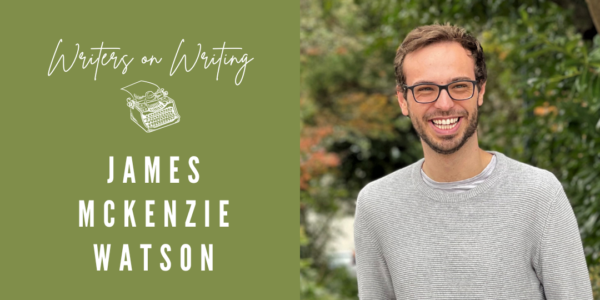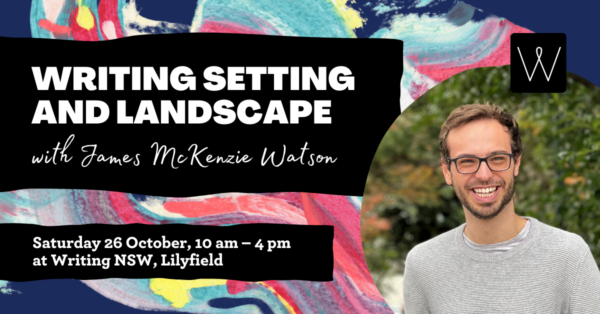
Writers on Writing is our regular conversation with a writer or industry professional about the writing craft, industry insights, and their own practice. This week, we spoke to author and Penguin Literary Prize winner James McKenzie Watson about Writing Setting and Landscape!
Your Penguin Literary Prize-winning novel Denizen is a rural noir thriller. What is it about the Australian landscape that readers find so appealing?
The easy answer is that Australia’s geography lends itself exceptionally well to thriller narratives. It’s not just staggeringly beautiful – it’s vast, it’s unknowable and it’s sparsely populated. A thriller writer’s dream!
For me, a lot of the appeal is in the familiarity. I grew up in rural NSW and as a teenager was forever hunting out depictions of the world as I knew it. I think many Australian readers are still doing this: we want to see our unique landscape celebrated, explored and dissected on the page. We want to feel seen.
That said, it’s not as simple as convincingly describing the physical world. You could get your fix of Australian-ish countryside by reading Cormac McCarthy’s descriptions of Southern Texas, but a place is nothing without its context. Interior Australia is awash with fragmented perspectives and competing narratives that could only exist there. The best rural Australian novels embrace this by making the landscape more than just setting – they make it as vital to the book as character or plot.
What’s the connection between character and landscape?
What a great question! I don’t think they can be separated. A character always has to exist somewhere, and a landscape always has to have something happening on it. But – and this is the crucial bit – since writing involves getting inside a character’s head, the landscape is always going to be filtered through the character. This means writers can recruit landscape descriptions into doing the heavy lifting of character development, because where a character is will never be as interesting as how they feel about that place. Every opportunity to develop setting is also an opportunity to develop character.
From Jane Harper to Dave Warner, crime and thriller writers have long used rural settings to evoke danger and intrigue. Do you think urban or suburban settings can evoke this same sense of mystery?
To my mind, the actual location is almost irrelevant. Effective setting should be able to transcend any one geography because (on the foundations of strong descriptive writing) so much of its power comes from how characters perceive it. A studio apartment in inner-city Melbourne has as much potential to be a rich and evocative thriller setting as outback Northern Territory – so long as the writer has a good understanding of where they’re writing about, and it’s all described to us through a compelling point of view.
And coming back to that point about familiarity – we love seeing places we know explored in this way! Chris Hammer, Ashley Kalagian Blunt and Matthew Spencer have all written wonderful Sydney-based crime novels in recent years. For me, much of their power came from seeing places I knew well form the backdrop to dark and sinister events.
What’s your secret to evoking a setting without it becoming merely descriptive?
Introspection! Introspection is the writer showing us the world through their protagonist’s unique perspective. Without it, setting risks being merely descriptive and events risk merely happening. National treasure Lee Kofman says that “our foremost task (as writers) is to describe the world as it appears through the prism of our person.” Making our landscapes and settings do more than just provide backdrop is a wonderful way to achieve this.
James McKenzie Watson writes fiction with a focus on health and rural Australia. His novel Denizen won the 2021 Penguin Literary Prize and was shortlisted in the 2023 Ned Kelly Awards for Best Debut. Denizen also received a 2021 Varuna Residential Fellowship and a 2021 KSP Residential Fellowship. James has written for The Guardian, Meanjin, Kill Your Darlings and the Newtown Review of Books. He has appeared at events including the Sydney Writers Festival, Newcastle Writers Festival and BAD Crime Sydney. He co-hosts the writing and health podcast James and Ashley Stay at Home with author Ashley Kalagian Blunt and works as a nurse.
Enrol now in Writing Setting and Landscape with James McKenzie Watson, on Saturday 26 October, 10am-4pm at Writing NSW.
If you want to be the first to read great advice, prompts and inspiration from our incredible tutors, subscribe to our weekly e-newsletter Newsbite.
More from Writing NSW
Check out our full range of writing courses in Sydney, our online writing courses and our feedback programs to see how we can help you on your creative writing journey. Find out about our competitions and opportunities, as well as writing groups across NSW, and sign up to our weekly newsletter for writing events, opportunities and giveaways.

